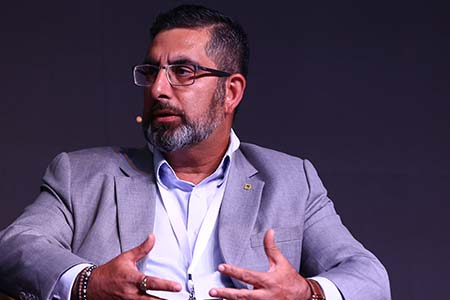Early this year, streaming service Netflix was made available in 130 new territories around the world, including the UAE and the MENA countries. BroadcastPro ME asks industry experts what this means for the region The legal and official arrival of Netflix is a positive step for the industry and consumers. We hope Netflix continues to take […]
 Early this year, streaming service Netflix was made available in 130 new territories around the world, including the UAE and the MENA countries. BroadcastPro ME asks industry experts what this means for the region
Early this year, streaming service Netflix was made available in 130 new territories around the world, including the UAE and the MENA countries. BroadcastPro ME asks industry experts what this means for the region
The legal and official arrival of Netflix is a positive step for the industry and consumers. We hope Netflix continues to take serious steps to restrict the availability of its US service through VPNs in the MENA region, as it contravenes the legal rights of licence holders like STARZ Play Arabia in the region. The Netflix service here does not have content depth or breadth that consumers are looking for in this region. Given that its a global service, the content is not specifically curated for the MENA region.
We know that consumers in the MENA region value recency of movies and want to see series at the same time as they are aired in the US. STARZ Play Arabia has exclusive long-term partnerships with major Hollywood studios such as Disney, Sony, Warner, Paramount and MGM. For example, February sees major new blockbusters like Gravity, Captain America: Winter Soldier and Maleficent only on STARZ Play Arabia, and not on Netflix.
Similarly, critically acclaimed and hit new series like Showtimes Billions and Starz original series Black Sails are available exclusively on STARZ Play Arabia. In addition to our original STARZ productions, our service also makes Showtime and CBS series available the same time as the US in the region. All our content is subtitled and curated for the audience in the MENA region.
We continue to strengthen our offering by adding new movies and recent series to the platform. We are also extending our reach to consumers by making it available on various platforms in the region and across multiple screens from mobile phones to the Etisalat set-top box at home. We are the only digital service available as part of Etisalat’s eLife On Demand service and are available on Ooredoos Mosaic TV service in Qatar as well.
Maaz Sheikh, CEO, STARZ Play Arabia
The arrival of Netflix to the Middle East is great, as it will propel viewers to the paid subscription model rather than the freemium. I also think that with the arrival of another OTT service, this will reinforce the power of digital video consumption in the region, similar to players such as UTURN and STARZ Play. Even though the market enjoys Western content, the challenge that Netflix will face is their ability to create and aggregate hyper-localised content that the viewers in MENA demand.
Kaswara Al-Khatib,
CEO & Chairman, UTURN Entertainment
The arrival of Netflix will:
Raise awareness of the entire SVOD sector with consumers, to the benefit of all OTT players. This will lead to subscriber growth across the board.
Increase demand and value of Arabic and international content OTT rights from SVOD services as well as FTA and pay-tv broadcasters, to the benefit of producers and rights holders.
Raise the bar for Arabic drama production when Netflix commissions its first series, to the benefit of viewers and producers.
Lead one or more Netflix-commissioned Arabic drama series to reach a global audience.
Increase demand for Arabic content and original Arabic productions from all SVOD players as they attempt to differentiate through content.
Possibly lead OSN and MBC to be more aggressive in marketing their OTT offerings. If there is a lesson to learn from the rise of Netflix in the US, it is that broadcasters allowed it to become too dominant through their inaction and by providing it with all their content.
Karim Sarkis, CEO, Sync Media
Netflix has brought attention to the SVOD space amongst both professionals and consumers. This is a good thing for the industry, and in fact, in most markets where Netflix is not the first entrant, their entrance has given a boost to OTT SVOD generally.
In the short to medium terms, a new entrant of Netflix’s size has to get the other local services interested. Its true that presently, Netflix has some time to work through its content rights such that they are available in the region, and so local players are at an advantage. They’ll have to work hard to capture enough market share to lock Netflix out, so to speak.
In the long term, once the rights have worked their way through and Netflix can offer the full suite of content, it will have been in the region two to three years at a minimum. Thats a long time in this space, and its hard to know how the market will pan out. Could the local players have succeeded in market share? Its a good question.
If other regions are indicative of Netflixs overall content strategy, it seems unlikely that they will have a large local content library. So I think the real players will be the local players providing Western content.
Samer Abdin, CEO, Istikana
Netflix is the latest and highest-profile VOD player to join an increasingly cluttered space in the MENA region, which already comprised icflix and MBCs Shahid among others.
Although nearly non-existent three years ago, this sector is now nascent, experiencing revenues and subscriber growth of 30%+ per annum, if not more. Netflix alone will boost regional VOD subscriber numbers significantly, as it already controls a sizeable audience here, who previously accessed the service via virtual private networks (VPNs).
Despite the continued migration of ad dollars to digital channels, regional broadcast television has remained resilient, maintaining 60%+ share of advertising revenues.
However, the coming years will see further fragmentation of audiences as online video providers and VOD players eat away at both viewers and ad dollars. We expect to see the television industry transform significantly in the coming years as a direct result of this trend.
Dimitri Metaxas, MD MENA, Omnicom Media Group
















































































